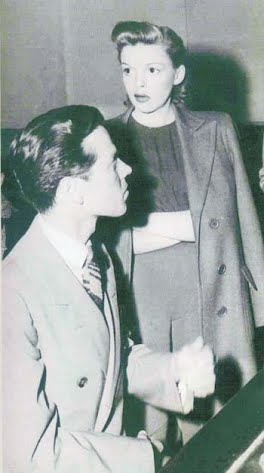The absence of the witch

For a while I've wanted to share what is, hands-down, my favorite Emily Dickinson poem. For those who claim to need a translator to read poetry (ahem, B) here's a six-word summary: It's about love, loss, and eternity.
I've had my hands full lately with lots of fun stuff: traveling to see family and friends, trying to stay abreast of Ookoo work, and starting a new and exciting reporting job. Here's hoping you still have love for this witch, even when I've been absent from your blog feed for a couple weeks.
Long Years apart can make no
Breach a second cannot fill--
The absence of the Witch does not
Invalidate the spell--
The embers of a Thousand Years
Uncovered by the Hand
That fondled them when they were Fire
Will stir and understand.
Happy golden days of yore

To be stored away for your holiday cocktail party conversation purposes:
"Hugh Martin, the composer, lyricist, arranger and pianist best known for creating the Judy Garland standards “Have Yourself a Merry Little Christmas,” “The Boy Next Door” and “The Trolley Song,” died on Friday at his home in Encinitas, Calif. He was 96.
Garland initially refused to sing the holiday ballad, which began, "Have yourself a merry little Christmas/It may be your last," until that second line was softened to "Let your heart be light."
-from Martin's March 14th 2011 obituary in the New York Times
It sounds morbid, but the New York Times' Obituary section is one of my favorite parts of the paper. I started reading it regularly on the recommendation of a friend who has it set as her homepage. I was pretty horrified the first time I saw her open her Internet browser, but it made sense when she explained it to me. Think about it: Anyone notable enough to be written up in the New York Times upon his or her death has probably had a very interesting life, and has contributed something pretty major to society.
Now it's one of my favorite feeds on my RSS reader-- I always learn something new and often come away inspired.
Come on, come out

"Spend the day outside communing with nature. Seriously. It's like pushing a reset button on your mind and wiping out the crazy."
-Rory Freedman and Kim Barnouin in the Skinny Bitch series (which I picked up at the library but don't exactly recommend, although it has its moments.)
I'm a firm believer in the crazy-erasing effect of spending any decent amount of time outside, whether it's a day-long hike in the rainforest or a 20 minute walk down a tree-lined street (which is how I came to take this photo.)
On Ohio and oregano

From a reportorial standpoint, I'm completely in awe of Matt Taibbi and his fearlessness. He writes for the typically liberal Rolling Stone, but he personally never comes off as left or right-- he's just fiercely anti-corruption. His beat at RS for the past few years has been Wall Street, which has obviously led to lots of interesting articles. Whether you agree with him or not, the man has cajones and he's exhilarating to read.
For a primer on Taibbi's style and outlook, you should watch Amy Goodman's recent video interview with him. In it, he compares Ohio's current governor to the kind of drug dealer who swaps in oregano for weed. He says this intelligently, calmly, on television, wearing a suit, not blinking an eye-- and it totally makes sense in the context he's presented. I'm telling you, the guy has a gift.
I've transcribed some of the best of it below, but you should watch the video yourself, if only for the rare opportunity to see an on-air reporter like Amy Goodman: A beautiful, smart woman who is apparently aging naturally, gray hair and all.
MATT TAIBBI: Just to back up, you know, provide some context for this Wisconsin thing, and especially for the Ohio thing, given, you know, what their governor [John Kasich] used to do for a living.
AMY GOODMAN: Explain.
TAIBBI: Well, he was an employee for Lehman Brothers, and he was—
GOODMAN: This is Governor Kasich.
TAIBBI: Governor Kasich. And he was intimately involved with getting the state of Ohio's pension fund to invest in Lehman Brothers and buy mortgage-backed securities. And of course they lost all that money [after Lehman went bankrupt in September 2008 and the subsequent collapse of the housing market].
...But what they're doing now is they're blaming the people who are collecting the pensions. They're blaming the workers, they're blaming the firemen, they're blaming the policemen. In reality, they were actually the victims of this fraud scheme.
The only reason people aren't angrier about this, I think, is because they don't really understand what happened. If these were car companies that had sold a trillion dollars worth of defective cars to citizens of the United States, there would be riots right now. But these were mortgage backed securities, it's complicated, people don't understand it, and they're only now I think beginning to realize they've been defrauded.
The broad crime in all of this was just fraud. These banks... took this stuff that they knew was very, very risky and very, very likely to default, and they were going to the State of Wisconsin, the State of Ohio, the State of New York, and saying, 'Hey, this is as safe as United States treasury bonds. You should buy this, and you'll earn a little bit more than you'll earn with t-bills.' The reality is, they were taking absolutely worthless stuff and sticking it with these people and then fleeing the scene.
This is no different than drug dealers who take a bag of oregano and sell it to you as, you know, a pound of weed. That's exactly the same scam.